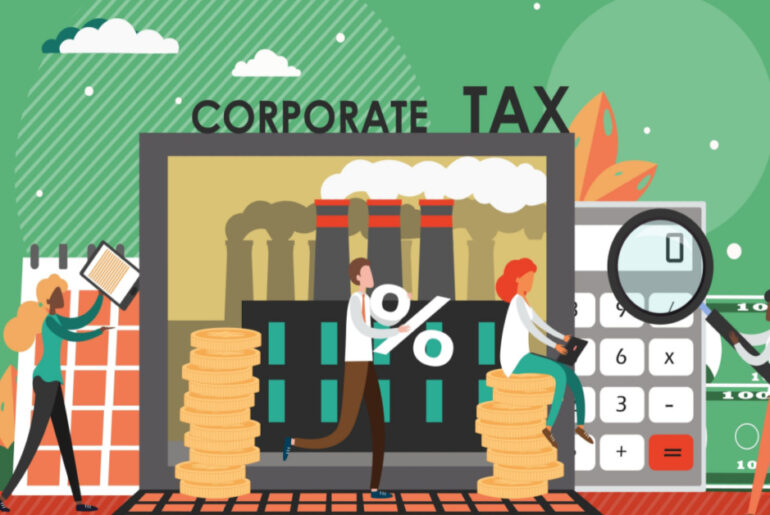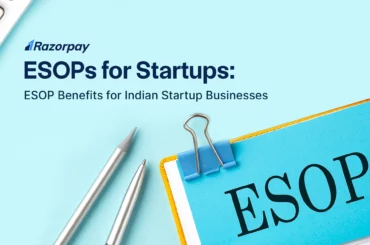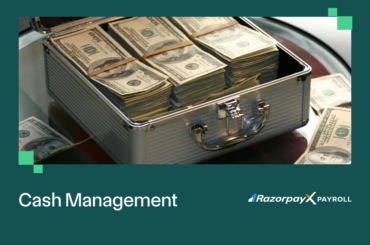Corporate tax accounts for a major share of the Government of India’s revenue. Every business operating in the country pays corporate taxes.
If you are a business owner or startup founder looking to learn more about corporate tax in India, here’s a quick read to help you out.
Table of Contents
What is corporate tax in India?
According to the Income Tax Act 1961, the Government of India levies taxes on domestic and foreign corporates. While domestic companies are taxed on their universal income, foreign corporates are taxed on income accrued in India only.
A domestic company is defined as a company that is registered under the Companies Act in India. It also includes foreign firms whose management is based in India.
A foreign company is not registered under the Companies Act. Its management and headquarters are located outside the country.
The calculation of corporate tax depends on the net income of a company.
What are the sources of income for a company?
Given below are some of the sources of income for a company.
Profits of a business
The excess of a company’s revenues over its expenses is called profit. It is the fundamental source of income for any business.
Capital gains
Capital gain is the increase in the value of a capital asset of the business. Capital gains are realised at the time of selling the asset and act as a source of income for the business.
But, what is a capital asset?
A capital asset is an asset of a business or an individual that has a useful life of more than one accounting period – usually one year. So, any asset that delivers value to you for more than one accounting period is a capital asset. Examples include rare art or collectables, homes, cars, land, and even stocks.
Capital gains explained with an example
For example, if a piece of land was bought for business purposes for Rs. 10,00,000 (purchase price of the asset) and sold a few years later at the market price of Rs. 15,00,000 (selling price of the asset), then the difference between the selling price and the purchase price (15,00,000-10,00,000) = Rs. 5,00,000 is referred to as capital gain.
When the piece of land is actually sold and the business receives the payment for the transaction, then such capital gains are said to be realised and are taxable as part of the income of the business.
Note that only when you sell the asset and receive the gain amount in cash or otherwise is said gain taxable. In the above example, if the business purchased land at Rs 10,00,000 and did NOT sell it, then irrespective of the market value, there would be no income from gains and therefore nothing to pay tax on, under this head of income.
Depending on the holding period, it can be short-term or long-term.
Income from rent
Any rental income from a property owned by the business is considered income from the business by the I-T department.
Income from other sources
It includes dividends, interests and other income for which the tax-paying entity doesn’t have to pay taxes under other heads.
Corporate tax planning
As a business owner, you need to formulate strategies to maximise your profits and minimise tax liability. This is referred to as corporate tax planning.
Businesses should be aware of tax laws and rules for effective tax plans. Many corporates hire legal and financial professionals to make tax strategies. It is pertinent to note that ignorance of the law at the time of tax planning or filing does not make you immune to penalisation by the I-T department.
When corporates are making tax plans, they take into account the following:
- Capital budget
- Expenses
- Sales and marketing expenses
Corporate Tax Rate for a domestic company
The table below displays the applicable corporate tax rate for a domestic company in AY 2021-2022:
| Gross Turnover | Corporate Tax Rate |
| Up to Rs. 400 crore | 25% |
| Exceeding Rs. 400 crore | 30% |
Corporate Tax Rate for a foreign company
The table below displays the applicable corporate tax rate for a foreign company in AY 2021-2022:
| Income Nature | Corporate Tax Rate |
| Royalties/fees for technical services received by a foreign corporate from GoI/any Indian concern | 50% |
| Other income obtained through Indian operations | 40% |
The Government of India introduced new rates of corporate taxes, which are applicable only to specific companies.
The table below shows the tax rates that are applicable only for certain corporates:
| Type of Company | Corporate Tax Rate | Requirements/Benefits |
| Companies not seeking incentives/exemptions | 22% (earlier 30%) + Applicable Cess & Surcharge. Corporate tax rate effective at 25.17% | Companies don’t have to pay MAT* |
| Corporates seeking incentives/exemptions | Remains unchanged at 30% | MAT rate is reduced to 15% from 18.5% |
| New Manufacturing Companies | 15% (Earlier, it was 25%) | The company should be incorporated before October 2019 and start production before March 2023 |
*Note: MAT = Minimum Alternate Tax. Scroll down for more details.
Surcharge rates on corporate tax
In addition to tax rates, here are the surcharge rates for corporate taxpayers:
| Income range | Surcharge Rate |
| Rs. 1 crore to 10 crore | 7% on the tax calculated for domestic companies / 2% on the tax calculated for foreign companies, based on rates mentioned above |
| Exceeding Rs. 10 crore | 12% on the tax calculated for domestic companies / 5% on the tax calculated for foreign companies, based on rates mentioned above |
Health and education cess
Additionally, a Health and Education Cess that is 4% of the total tax liability + surcharge as mentioned above will be added to the tax payable before such cess.
Minimum Alternate Tax (MAT)
In case the total tax liability of a company for a given assessment period on the total income is under 15% of the book profits after adding surcharge and HEC, then such a company would have to pay Minimum Alternate Tax, a type of token tax monies.
This applies if the company in question has not opted for Section 115BAA or 115BAB.
MAT is charged at 9% plus surcharge and cess per the rates above if the company in question is a unit of an international financial services centre, and earns its revenue only in the form of convertible foreign exchange.
MAT can be carried forward and adjusted against the regular tax liability for up to 10 consecutive years.
Application and Exemption of Minimum Alternate Tax (MAT)
Minimum Alternate Tax applies to all kinds of companies, including foreign companies which have income sources in India.
MAT, however, does have some exceptions. For instance, under Section 115B, any company set up for the business of life insurance will be exempt from MAT.
Further, companies that generate revenue out of a business in shipping will be exempt from paying MAT, as per the provisions under Section 115V-O.
Trivia: The Government of India made a net tax collection (corporate and income tax) of Rs. 14.09 lakh crore in financial year 2021-2022. It’s the highest ever figure. It is also a remarkable achievement because it reflects economic recovery in a year that saw the country getting battered by two waves of the COVID-19 pandemic.
Provisions for corporate tax rebates
Some of the important provisions for corporate tax rebates are as follows
- The IT department allows deductions if a corporate set up new infrastructure or power sources
- Rebates are available for dividends as per applicable terms and conditions
- A deduction is allowed on interest income in certain instances
- The IT Department allows certain deductions for exports and new undertakings of a business
How to pay corporate tax online?
Trying to figure out how to pay corporate taxes online? Here’s something to give you a boost.
Businesses can make corporate tax payments online through the e-payment facility of the official portal of the I-T Department.
- If you’re paying taxes for your business, you would need the ITNS 280 challan to pay the corporate tax online through the e-payment mode.
- You’d further need to provide essential information in the challan, such as the correct PAN, address, email ID, phone number, and financial and assessment year number.
- Additionally, you’d need to select code 0020 (for corporate tax payment) and then make the payment via net banking.
P.S. Want to pay Advance Tax, GST, and TDS without hopping buggy government portals and typing in your ID, password, and details over and over again?
Check out the ultra-smooth and super-secure RazorpayX Tax Payment suite!
RazorpayX offers automated tax payments that are specially customised for start-ups. Moreover, it helps people make advance tax payments on time. It offers a single dashboard for advance tax, GST and TDS to facilitate smooth and seamless payments.
RazorpayX is a full-stack banking suite that supercharges the current accounts which enables:
- Banking which Provides end-to-end automation with powerful features like Automated Accounting, OTP management, Maker-Checker Flows,
- Corporate Cards with 20X higher limits
- Automated Vendor Payments
- Payroll – India’s ONLY payroll with Full compliance automation, Employee Insurance management and TDS filing)
With platforms like RazorpayX, you can supercharge and power your business banking like never before.
Frequently Asked Questions
What is Minimum Alternate Tax or MAT?
The Government of India introduced MAT (Minimum Alternate Tax) to address the gap between income calculation and book profits. Many companies make huge profits. They pay dividends to their shareholders. But they use deductions and exemptions of IT Act and pay minimum to no tax. Now, as per the mandate of IT Act, these companies must pay a certain percentage of their profits as MAT. It is applicable for all companies operating in India.
What is Dividend Distribution Tax or DDT?
Corporates had to pay taxes for distributing dividends among their shareholders. This tax is referred to as dividend distribution tax. Do note, DDT or dividend distribution tax has been abolished now.




